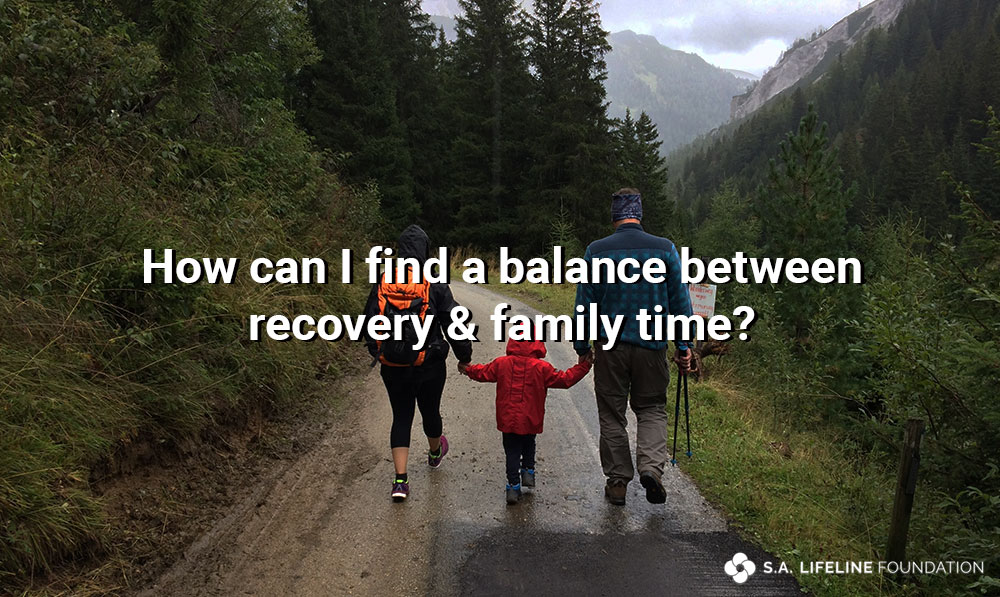Thanks for all the questions that have come up about recovery and healing from sexual addiction. From physical touching boundaries to whether or not the 12 steps work, the questions have been so helpful and created a real conversation.
Keep them coming!
Today’s question comes from a brother who participates in the men’s online meetings. It’s about finding balance in recovery.
“Who has found or made good progress toward a healthy balance between recovery and personal development work and family/spouse time?
“What are some strategies you’ve found helpful?”

I found a few suggestions that caused me to think about balance in a different way:
1. Balance is not a final goal, but an ongoing process.
Being balanced doesn’t necessarily mean complete relaxation, an ongoing calm feeling or being happy all the time. In fact, based on the culture I’ve been raised in, I think there is some confusion about what it really means to be “happy” and balanced.
Balance actually may only occur for a small moment, but it can then appear over and over again if one is willing to let it.
Suggestion: Rather than trying to stay balanced, think of yourself as practicing balancing, over and over again. As we keep practicing finding balance, we will find it. Of course, we will lose it. But we will find it again.
2. Prioritize.
Are we doing the most important things first? What are the “most important things”? The problem is often figuring out what is most important and then committing to that consistently.
Suggestion: In order to stay on course, you may have to re-examine your priorities regularly and share them with a sponsor or someone that can keep you accountable.
3. Set both long and short term goals.
This can be called Strategy and Tactics, where Tactics are the day to day, moment to moment things I do to help me achieve my Strategy – the long-term objectives.
Suggestion: Consider what your Strategy and Tactics might be. We focus a lot on living “one day at a time.” Does that mean long-term goals need to be done away with?
4. Be specific.
People have better progress when they say things like, “I’m going to spend an hour alone with each child sometime this week,” versus, “I’m going to have quality time with each of my children.” Although quality time is a great concept, it’s also really vague. Since it’s so vague, it’s hard to know whether or not you’ve accomplished that goal, which makes it hard to feel in balance.
Suggestion: What are your specific goals when it comes to working recovery? Have you considered these and shared them with your sponsor or others in the group? Remember, “Half measures availed us nothing.”
5. It’s often easier to find balance with another person.
Interaction can be the key to establishing balance in one’s life. This reminds me of the video that talks about how “the opposite of addiction is CONNECTION.”
Suggestion: Reach out! Connect with others in real ways. If you haven’t yet, get a sponsor and work recovery together. Start doing check-ins with your wife. Call other people in your group during the week to let them know what your thinking and feeling and to see how they’re doing. Connection is what we’re all looking for.
How are you finding balance in recovery?
Recovery.
Personal development.
Family time.
Spouse time.
All important things; finding a balance can be tough.







I think balance is incorporating recovery in our lives as part of our lives. Not something we have to do but something we do. The mistake I made years ago was thinking that sobriety was the end game for recovery. When I was sober I was recovered. I have learned this time that I will be in recovery for the rest of my life. I also learned that being sober does not mean my life will be perfect. It is not. However, the joy of recovery helps me manage life. Recovery gives me the tools to accept life as it is, good and not so good. None of this can be done without prayer, 12 steps (including regular meetings at least weekly, sponsor, surrender and reach outs (at least several a week)) and study.
Awesome topic and awesome suggestions. Balance in recovery is difficult for me. I have found like was mentioned in the discussion that I have to recommit and reevaluate frequently. Course corrections along the way that keep me headed in the right direction. I find that some things I am doing don’t work. That is when I commit to doing something different. Recovery, work, family, church, etc. There is a lot to be balanced! I’m grateful that I now have the tools (12 steps)to work that help me balance everyday.